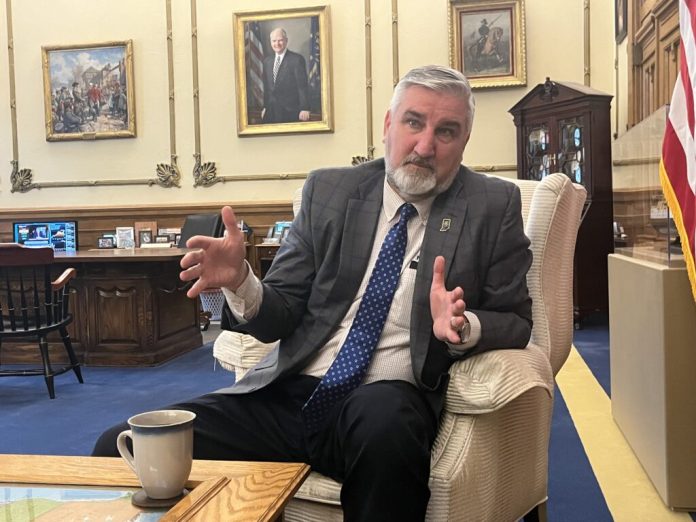
INDIANAPOLIS — In his final go, Indiana Gov. Eric Holcomb wants to double down on K-12 literacy initiatives and bolster workforce training but won’t seek specific policy related to growing concerns around Medicaid spending.
The Republican governor on Monday unveiled his 2024 agenda, the last in his eight-year tenure. His policy goals additionally emphasize a need for expanded pre-K and child care voucher eligibility, as well as increased access to disaster relief at the local level.
Specifically, Holcomb’s agenda targets earlier access to IREAD-3 testing and ensuring Hoosier students are mastering foundational literacy skills. The latest reading scores showed that one in five Hoosier third graders struggles.
Currently, the IREAD-3 exam is only required in third grade. The governor’s administration is hoping to require testing in second grade, too. Doing so could help teachers and parents better identify struggling students and implement additional supports — such as through summer school or after-school tutoring — before kids get too far behind.
Students who fail the standardized exam can already be held back, but there are exceptions if a child is disabled or an English-language learner.
State officials — including Holcomb — maintain that too many Indiana third graders who can’t adequately read are advancing to the fourth grade. His agenda seeks to tighten up the state’s retention policy to require third grade students who fail IREAD-3 and don’t qualify for an exception to be held back for at least one year, starting in 2025.
According to data from the Indiana Department of Education, in 2023, 13,840 third-graders did not pass I-READ-3. Of those, 5,503 received an exemption and 8,337 did not. Of those without an exemption, 95% moved onto 3rd grade while only 412 were retained.
None of Holcomb’s priorities would require lawmakers to reopen the biennial state budget during the short legislative session, however.
“Ultimately, this (agenda) will be very interactive … looking through a lens of our customers, citizens and local leaders — how they may access all the programs that the legislature, year after year after year, appropriates dollars to. These are programs that really do make a difference,” he said during an agenda announcement at the Indiana School for the Blind and Visually Impaired in Indianapolis. “Whether it’s a local government or philanthropic organizations or local leaders, some don’t know about some of the programs. And so, how can we better connect chambers, local leaders, etcetera, in a very easy way?”
Indiana’s General Assembly reconvened Monday for the start of the 2024 session. Legislative leaders said previously they’re not taking on new and controversial subjects, promising a “quieter” non-budget session.
While Holcomb’s agenda is closely aligned with goals expressed last month by Republican legislative leaders, his policy recommendations leave out issues like Medicaid reimbursement rates, gambling, chronic absenteeism and regulation of large water transfers.
Specific legislative priorities from House and Senate leadership are expected later this week.
This story will be updated.
— The Indiana Capital Chronicle covers the Indiana legislature and state government. For more, visit indianacapitalchronicle.com.




